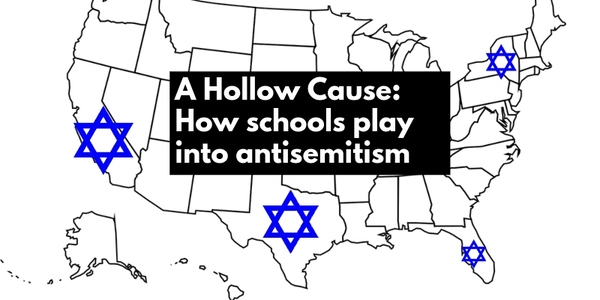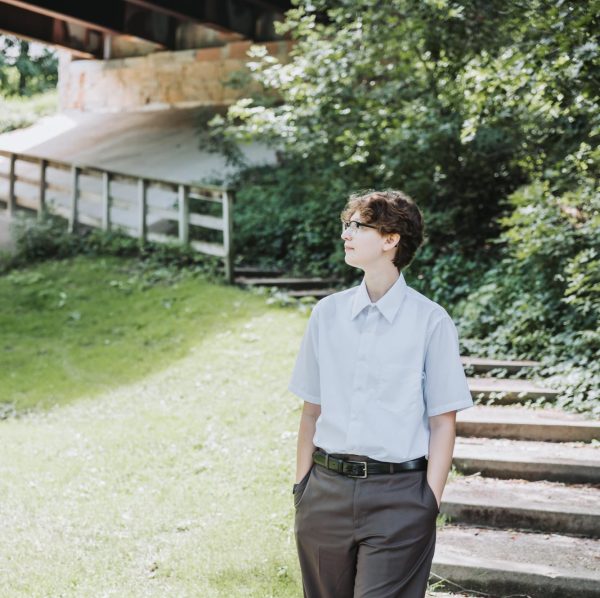A Hollow Cause: How schools play into antisemitism

The blue Stars of David represent where antisemitic attacks occur most often.
November 16, 2022
On October 7 2022, Ye (formerly known as Kanye West) used Twitter and Instagram to fuel his antisemitic outburst, claiming he was “going death con 3 on JEWISH PEOPLE.” Defcon, what Ye was referring to, is a military term used to define a national threat. There are five levels of defcon, level one being the lowest and level five being the highest. This term means Ye was preparing for some kind of threat from the Jewish people, or that he had violent intentions towards them.
However, this is not the only instance of antisemitism on the rise this year.
On October 22nd, people nazi saluted off of a freeway overpass in Los Angeles with banners reading “Kanye is right about the Jews”.
On October 27th, Kyrie Irving posted an antisemitic movie on Twitter.
While these are only three instances from many that have occurred this year, Kanye West’s recent hate speech brings light to the sharp rise of antisemitism over the years.
Schools have played an instrumental part in allowing it to happen by staying silent, and not doing enough to educate students about antisemitism.
Antisemitic attacks and harassment happens constantly, but it is not always reported, or talked about. Unfortunately, antisemitism has increased in the United States. In 2021, antisemitism in the U.S increased by 34% with reported numbers of 2,717 versus in 2020 with numbers of 2,026. Threats at Jewish schools, centers and synagogues went up by 61%. Antisemitic incidents at non-Jewish schools skyrocketed by 106%. Some reasons why antisemitic attacks happen so frequently is because of the denial of the Holocaust.
The Holocaust, also called The Shoah, was the genocide of six million Jews by Nazi Germany. The Holocaust took place during 1941 and 1945, and also targeted other ethnic groups like Rromanis, Ukrainians, and Poles. In 22 out of 50 states in the United States, Holocaust education is mandatory. This includes Wisconsin.
Despite the horrors that happened during the Holocaust, some teachers in Texas are taught to teach “opposing views” about the event. When we are talking about “opposing views”, these are views that are false, wrong, and offensive, views that attempt to justify the mass genocide of millions of innocent people. Some schools don’t even cover it, even if it is mandatory.
Another reason why antisemitism is on the rise is because of the belief that Jewish people control the banks, news, and media.
Teaching this to children is not only wrong, but it can have horrendous consequences. This is due to the Holocaust mandate in many states being incredibly unspecific as to what teachers should teach about it, how long and what they should cover about the topic.
One way to fix this is to update the Holocaust curriculum to include specific details about what to teach about, and not to just teach about the genocide, but our cultures and beliefs as well. There are many ways to do this. Some examples include taking field trips to Holocaust Memorials, talking about Jewish life previous to the Holocaust and afterwards, the survivors, and about how antisemitism is still very much alive.
In my experience as a Jew, sometimes it seems the only thing people know about us is the Holocaust but nothing about our culture. It’s important that teachers talk about our culture, which isn’t all Hanukkah and dreidel playing. We have major holidays, like Rosh Hashanah, Yom Kippur, Sukkot and Passover, and many other holidays as well.
In fact, Hanukkah isn’t even a big holiday. Hanukkah is a minor holiday that Americans blew up into something much bigger due to its proximity to Christmas. You can thank cultural appropriation for that one.
Talking about our culture is what is important. Before talking about the Holocaust, and after, it needs to be known we are still here along with the 332 million people in the United States.
Our history of persecution is gruesome, saddening, angering, and often untold in schools. Although the history of us may be uncomfortable to talk about, it’s crucial to talk about with antisemitism on the rise.


Lillian • Nov 28, 2022 at 11:48 am
I seriously love that this article brings anti semitism to light in a real way. Keep up the great work <3